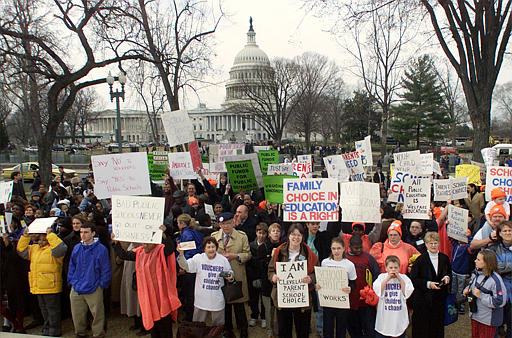Governments use school vouchers to transfer money to parents to allow their children to attend the schools of their choice. The use of school vouchers touches on First Amendment establishment clause issues when parents are allowed to apply the vouchers to private religious schools.
The idea for school vouchers originated with U.S. economist Milton Friedman in the 1950s.
Marketplace of schools competing for students underlies school voucher philosophy
As an alternative to what he saw as a government monopoly over education, he proposed a marketplace of public and private schools competing for students and offering a broader range of educational choices. Friedman believed that greater school choice would lead to higher educational quality and more integrated schools.
Critics of vouchers contended they would damage public schools by skimming off the best students, or that such programs would benefit the more affluent families, who could supplement the vouchers to pay the tuition at the more expensive private schools.
First Amendment concerns of school vouchers center on separation of church and state
Another criticism of vouchers was that the inclusion of parochial schools in voucher programs would violate the establishment clause of the First Amendment by diverting public money to private religious schools.
In Lemon v. Kurtzman (1971), the Supreme Court developed a three-part test to determine the constitutionality of government aid to religious institutions:
- the aid must be secular and neutral;
- it must neither advance nor inhibit any religion; and
- it must not foster an excessive entanglement with religion.
Court upholds various state programs allowing parents to use tax money on parochial schools
In Mueller v. Allen (1983), the Supreme Court applied the Lemon test to uphold a Minnesota law permitting parents to deduct up to $700 a year for educational expenses. Critics of this tax deduction contended it violated the establishment clause because it enabled parents to send their children to parochial schools, thereby allowing these schools to benefit from tax money.
But the Court decided otherwise, reasoning that all parents who had children in school, and not just those attending religious schools, benefited.
In Witters v. Washington Department of Services for the Blind (1986) and Zobrest v. Catalina Foothills School District (1993), the Court rejected challenges that providing vocational rehabilitation to a disabled student attending a religious school or a sign language interpreter to a deaf student attending a similar school were unconstitutional. Although the issues in these cases did not involve vouchers, they were important in that they paved the way for voucher programs and challenges.
Wisconsin’s school voucher program upheld by state supreme court, paving way for others
Wisconsin was the first state to institute vouchers. Its plan for Milwaukee County was upheld by the Wisconsin Supreme Court in Jackson v. Benson (Wis. 1998).
Ohio then instituted an initiative that called for a pilot scholarship program for students in Cleveland. Financially needy students could select among schools, including parochial ones. Among the private schools participating, over 80 percent were religious, and over 90 percent of the students in the program attended these institutions.
Supreme Court upheld Ohio school voucher program despite dominance of religious schools
Critics of the Ohio voucher program claimed it violated the establishment clause, but in Zelman v. Simmons-Harris (2002) the Court upheld the program’s constitutionality.
Writing for the 5-4 majority in Zelman, Chief Justice William H. Rehnquist held that the voucher program was only an incidental benefit to the parochial schools. As in Mueller, the primary benefit was to the parents and children. In addition, because the program was administered neutrally and did not favor any specific religion, there was no advancement that violated the first prong of the Lemon test.
Although the Supreme Court has upheld school vouchers along the lines of the Ohio program, states such as Florida have used their own constitutions to invalidate similar programs.
This article was originally published in 2009. David Schultz is a professor in the Hamline University Departments of Political Science and Legal Studies, and a visiting professor of law at the University of Minnesota. He is a three-time Fulbright scholar and author/editor of more than 35 books and 200 articles, including several encyclopedias on the U.S. Constitution, the Supreme Court, and money, politics, and the First Amendment.

